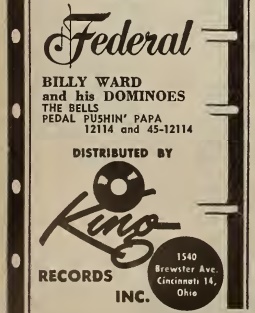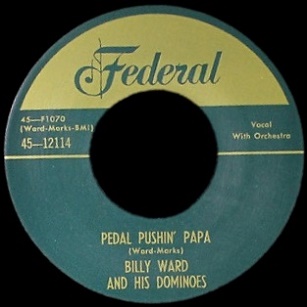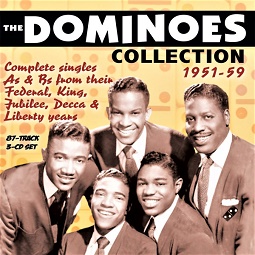The Dominoes: “Pedal Pushin’ Papa”
22 Thursday Feb 2024
Written by Sampson
Tags
No tags :(
FEDERAL 12114; DECEMBER 1952

Closing out 1952 with a song designed to conjure up early to mid 1951 hardly sounds like the best way to wrap up a pretty eventful year in rock ‘n’ roll with so many new and exciting plateaus being reached over the past twelve months.
Even though the record The Dominoes were referencing here had been one of the most enduring hits of the previous year, not to mention their defining performance, it’s not as if they were struggling since then and needed to recall their last moment of relevance before they slipped off the radar entirely. They’d reeled off hit after hit since that time including another massive chart topper last spring. It’s a curious decision to revisit the past when their future still seemed bright, especially when nobody at all would dispute the claim of The Dominoes still reigning as rock’s premier group.
But in a way this is actually the perfect way to close out the year, as this record – depending on your point of view – codifies the huge gains made by rock ‘n’ roll over the past few years, or provides a friendly reminder that even the most celebrated acts are always living on borrowed time.
Both are crucial lessons to be learned by everyone.
He’s A Killer
I’m sure that there are those out there who wonder why we take such joy in tearing down certain rock icons… be it overrated record owners like Sam Phillips or Ahmet Ertegun, or innovative songwriters and group founders like Billy Ward.
Okay, here’s why…
Above all else we want credit properly bestowed on those who’ve earned it (IE. the artists themselves) and when too much is given to those undeserving of it, in the case of the label heads who systematically cultivated writers over the years to get a greater share of the glory… or in Ward’s case, who forcibly tried wresting that public credit during The Dominoes’ career, in the process breaking up the best edition of the group… well, why WOULDN’T we call them out on it?
Our job here isn’t just to review the records but to tell the story OF those records and the people who made them. That means praising them when they deserve it and conversely ripping them to shreds when it’s called for.

Billy Ward has received a ton of praise around here for the majority of their records to date, but recently we’ve started to throw plenty of criticism his way because his outsized ego, underlying insecurity and pathological need for maintaining rigid control over people has created insurmountable fissures within the group. With his own growing personal distaste for rock ‘n’ roll itself becoming more apparent, it’s inevitable that their records will soon be far less vital for our needs.
Pedal Pushin’ Papa sort of sits on that fault line just as it’s about to rupture.
On one hand it is a definite rocker, but it’s one built entirely on past triumphs. It has a decent feel to the record because of what it recalls, yet the song features a lesser vocalist in the lead because the original voice in this role left the group due to Ward’s autocratic persona. The record hints at suggestiveness in both the lyrics and performance but those inferences are drastically reduced by Ward in a concerted and misguided effort not to be pegged as an act that relies on shock value for their success.
As a result while this still is a good record, it’s one where the warning signs are all more prevalent than they were last year, telling us that things were changing with The Dominoes and not for the better.
You’ll Know That I Was There
First things first… David McNeill is no Bill Brown when it comes to lecherous singing. It was Brown, of course, who had taken the lead on the classic Sixty Minute Man, and despite the rumors to the contrary it was also Brown who DID sing lead on the unreleased version of this song cut back in January before departing soon after… which is surely why it wasn’t released at the time. Now in the years since, that initial take has been exhumed in countless hits collections which tends to lead to confusion over just who is behind the microphone for it, Brown or David McNeill. But voices don’t change, the tonal qualities of that earlier hit and the Brown-led unissued version of the sequel are identical and, not for nothing, it’s also much better sung, even though it remains a fairly shameless rip-off of their crowning achievement.
But now almost a year later, for reasons we can only guess – and which probably have more to do with Ward’s attempts to show he, not his singers, was the reason for their success – he tried again with Pedal Pushin’ Papa featuring The Dominoes new bass singer, David McNeill, in the hopes that by now the familiar melody and racy theme was far enough in the past that listeners would fondly recall it without fully remembering why the original was so much better.
The problems start with the theme itself, for whereas that immortal song pulled no punches with either story or performance, as Clyde McPhatter’s orgasmic cries in the background were meant to suggest the woman being enthusiastically ravished by her man, on this entry they’re keeping things decidedly PG rated, something not helped by McNeill’s lack of sly intent in his singing that might otherwise imply something that wasn’t present in the lyrics.

If this were merely foreplay to an expected bed-rocking finale later in the evening that’d be one thing, but no, this is definitely the main event and as such he’s not even trying to go past second base. Frankly, I think he’s going to be held to a long single if not thrown out as he breaks into a self-satisfied jog after rounding first, assuming he doesn’t even need to hustle in order to get a stand-up double.
Provided you care more about the overall rhythmic qualities of the recording which remain solid, you still may get a lot out of this. They still can sing of course, and if Clyde’s not as rambunctious behind the lead, he’s still a notable presence. Meanwhile McNeill may never get his own pants off in the story and doesn’t embody the cocky Lothario that Brown perfected, at least he’s attempting to strut around the room while he unfastens his belt, as if he’s already got plenty of notches on his headboard.
The fact that he’s assuming the persona of “lovin’ Dan” makes this seem more familiar, even with a different actor in the role, but it also makes the attempt seem a lot lazier, even if you DO like the results just fine. I guess it helps the first song just happened to be one of the catchiest tunes in rock ‘n’ roll to date which goes a long way in getting past any complaints of musical recidivism.
Much like we criticized Aladdin Records for forcing Amos Milburn to effectively re-work Chicken Shack Boogie a couple of times, even as some of them came out pretty well, we may dislike the intent of Pedal Pushin’ Papa but we still can appreciate the results to a degree… how it sounds rather than what it shallowly is trying to do.
But that still has it’s limits. Though we may like the overall feel of the record, it’s nowhere near as thrilling as the first go-round with this same basic premise. The lyrics are much weaker, the lead singer comes up short by comparison to his predecessor, while the excitement – both musically and vocally – is toned down considerably at every turn. As a result the message it sends is that they’re content to rehash what worked in the past rather than try and come up with something new for others to copy in the future.

When That Trip Is Over
The public sort of disagreed with me, which is their right of course and I defer to their tastes with one small caveat… namely after the attempt at pop crossover success their last time out, there’s a chance that their fans’ enthusiastic response to this warmed over meal was in a sense trying to implore The Dominoes not to stray too far from the more authentic rock framework.
Surely that is something that should’ve been apparent to Billy Ward… the recent pop-leaning sides were their only commercial missteps and now as soon as they reverted back to solid rock footing they hit #4 on the charts even though Pedal Pushin’ Papa was little more than a facsimile of their best efforts. I’ll even go so far as to say if the Brown-led version had been put out in its place it might’ve topped the charts. I’d certainly go another point higher with it myself… maybe even two on a good day, albeit with reservations because regardless of who’s singing it’s still not fresh enough to earn the highest marks. But it IS demonstrably better than this effort, and this one still isn’t bad.
Remember too, Federal Records were very stingy in their releases for the group, which is a GOOD thing, not flooding the market with subpar material just to take advantage of their popularity. But the result of that is the audience hadn’t gotten their fill of The Dominoes over the past two years, even if most of that work had been voraciously consumed by the masses.
That meant they were eager for a new record in their preferred style, even if few of them would’ve said this matched their peak performances.
Still, commercially speaking this is an unquestioned success and it remains a fairly well-made, rather enjoyable and at least an appropriate record for rock’s needs, even if at the same time it was a troubling record for the future prospect of Billy Ward’s Dominoes because it allowed us to see the approaching storm clouds as we get ready to enter a new year.
SPONTANEOUS LUNACY VERDICT:

(Visit the Artist page of The Dominoes for the complete archive of their records reviewed to date)
